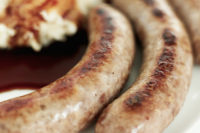If you've eaten at a restaurant this year, you're familiar with the diversity of sausage offerings, whether a turkey sausage breakfast sandwich, modern peasant fare of homemade sausage, mustard, potato dumpling and kraut at a trendy restaurant, or just a straightforward bratwurst at a baseball game or cookout.
Sausage really is the "no drama" cousin of bacon - a beneficiary of stable prices, versatility and indulgence (or not, if diners aren't up for high-end, unique, specialty sausage).
Although there are some rumblings of upcoming price increases this year due to a reported corn shortage in the U.S., it's safe to assume that sausage will continue to expand its reach on restaurant menus and deli and meat department cases.
Dinner sausage dollar sales at retail, in fact, increased 4.6 percent to $2.9 billion, and unit sales increased 3.9 percent to 793 million pounds, according to Chicago-based SymphonyIRI Group (as of Jan. 9, 2013). Breakfast sausage and ham dollar sales, in that same time period, increased 2.2 percent to $1.4 billion, and unit sales increased 2.4 percent to 446 million pounds.
"The sausage category, similar to all other foodservice categories, has been impacted by slow industry growth," says Gary Karp, executive vice president of Chicago-based Technomic, a food industry research and consulting firm. "However, it appears sausage has fared slightly better due to the continued growth of breakfast offerings and its relatively favorable cost position to some other breakfast meats, specifically ham and Canadian bacon - and the other attractive feature about sausage is the opportunity to get products cooked or raw to fit the operations at foodservice units."
According to Roger Williams, president, Williams Sausage Co., based in Union City, Tenn., demand has remained steady this year but not expanded a lot because consumers are more health-conscious and may only view it as a weekend indulgence.
"Our breakfast sandwiches, however, are growing rapidly, because of their convenience to consumers who don't cook as often," says Williams. He notes that his company will be launching more breakfast and ready-to-eat sausages, as consumers are gravitating toward their quick preparation.
Sausage's versatility allows it to fit multiple price points, all meal types, fat contents and creative dishes, and also allows it to be easily prepared, notes Judy Preiss, partner and sales and marketing, Pulaski Meat Products, Linden, N.J.
"Demand is up because breakfast is driving the category," she says. "Pork is definitely the breakfast of champions."
Battling it out for breakfast dominance
During the last year, more fast-food chains used sausage in their efforts to build and promote new breakfast items, including such chains as Dunkin Donuts, Wendy's and Taco Bell.
"These efforts seemed to positively impact growth of the foodservice breakfast day-part and promote sausage's image during a very difficult economic environment," says Karp.
According to Mintel International's "Breakfast Foods - US" September 2012 report, breakfast meats continued to battle it out with breakfast breads and pastries for control of the breakfast segment, with each of these areas owning about 40 percent of the market. Mintel estimated that breakfast meats grew by 13.3 percent during the review period but were flat on market share. The report concluded that both breakfast breads and meats grew due to product innovation and healthful products.
More specifically, Mintel's "Consumption of Breakfast Foods - US" September 2012 report placed breakfast sausages third on its list of breakfast foods eaten during the week, with 33 percent of respondents claiming to eat it, 26 percent noting they eat it during the week and 26 percent during the weekend. By comparison, packaged bacon came in slightly lower at 31 percent, 24 percent and 25 percent, respectively.
Sausage is certainly making inroads on breakfast pizzas. In the last five years, consumers have increasingly opted to start their day with a breakfast pizza, albeit a healthier one. Pizza has begun appearing on 5 percent of all chain- and independent-restaurant breakfast menus - an 18 percent increase - reported Los Angeles-based Dataessential research and consulting firm. Sbarro, for example, is selling a pizza with sausage, bacon, eggs and mozzarella.
Sausage is very accommodating to seasonings from spicy and hot to mild.
"What we are starting to see is some changes in the combination of ingredients, specifically the type of cheeses used in breakfast sandwiches," says Karp.
According to Williams, his company is looking at introducing a healthier option for morning breakfast sandwiches, such as turkey sausage on whole-wheat bread.
Jimmy Dean has launched a low-fat, low-calorie Delights Turkey Sausage Whole Grain Bagel Sandwich and also offers a Delights Turkey Sausage Breakfast Bowl. Smaller producers are launching healthier efforts, as well, says Williams.
Smithfield Foods' John Morrell is also looking into healthier links with its Armour and John Morrell 40% Lower Sodium Frank line, targeted toward foodservice operators (joining the John Morrell Group's Eckrich 33% Reduced Sodium Smoked Sausage).
The John Morrell Food Group and Cracker Barrel are pairing up to bring Cracker Barrel's reputation to the grocery aisle with a multi-year licensing agreement. The companies will join forces to launch summer sausage, ham, bacon, assorted lunch meats and jerky to retailers including grocery, club stores and mass merchandisers.
Incorporating new flavors
Indeed, sausage has successfully navigated a twisting terrain in which certain segments had demonized it for being fattening. However, now all menus carry it because it can consist of finer materials and ingredients, including even ostrich, veggies and chicken.
"People realize this is not the sausage from the 1960s," says Preiss. "Better companies produce better sausage.
"Our [products are] gluten-free [and] high in protein, and the product tastes phenomenal," she adds, noting that her liverwurst and Kiska are the only two products out of more than 100 that are not gluten-free. "Customers want to eat something healthy that they love."
Preiss also says some companies are experimenting with sausage patties to fit bagels and promoting sausage for use in soups. H-E-B's Central Markets in Texas has been experimenting with its private-label selections to include flavors such as taco, maple, chorizo, chipotle, Italian and traditional flavors such as sage, notes Williams.
"They are unique flavors, and they are doing a pretty good job with them," he says, "but we aren't seeing this yet with branded companies."
This spring, the Hillshire Farm brand, for one, is launching new additions to its Gourmet Creations SKU, a line of premium pre-cooked smoked sausage, with Chicken Basil Pesto with Parmesan and Provolone Cheese, and Angus Smoked Sausage in Smoked, Polska Kielbasa and Italian Style.
Some consumers are even trying their hand at curing meats and making sausages themselves, with some meat shops offering lessons on sausages and charcuterie, reported the Vancouver Sun.
Back to basics
Alef Sausage is the first company in the United States to make its sausage in the Eastern European style with its authentic processes, fresh ingredients and spices, and use of traditional family recipes.
"We offer a different flavor and combination of ingredients, but the quality is much better," says Alec Mikhaylov, owner of Alef Sausage, based in Mundelein, Ill. "The sausage comes from good fresh meat, and we don't add any extra product, either, like soy protein, binders or fillers."
Mikhaylov notes that his products are drawing all consumers, not just those with an Eastern European background, to his suburban Chicago deli and other retail outlets.
"A lot of people want a good product that won't spoil fast," he notes. "Our spices are custom-ground on the day we order them. And our meat products are naturally smoked according to Old World methods. Unlike many of our competitors, we do not add cultures - they occur naturally in the product, the way it was done in the old days."
The processor is working on creating a new all-natural line that won't contain any chemicals like nitrates and phosphates.
"People don't want to eat chemicals and preservatives," he says. "We have created and had this line approved, but it's not yet out in a big quantity."
Preiss agrees that consumers find comfort in the flavors from their childhood and, well, comfort foods. "Shoppers walk in and smell our store and say, 'That's how my grandma used to make it,'" she says. "People are not afraid of it and will pay for the authenticity."
Rising prices?
The issue of price, however, is looming over this year's product. The 2012 drought in the United States affected the amount of feed grains harvested and sent corn's price soaring, which consequently affected pig production. Swine and beef producers responded by lightening their herds and sending pigs to slaughter.
However, agricultural economists don't expect to see a shortage of bacon and sausage products this year - just a price increase of, perhaps, 10 percent total, according to The Associated Press article, "Bacon Shortage 'Baloney,' but Prices to Rise".
"We will see prices go a bit higher for all meat products," says Preiss. "So it comes down to what consumers want to treat themselves with for breakfast or any meal. With breakfast, they are happy to start the day with protein so they don't run on empty all day long."
In addition to product quality, consumers are starting to hear more about the quality of life of the animals used for production, says Karp.
"We are hearing interest in local, natural and some lesser, but still noteworthy, interest in organic," he says, adding that the gestation-crate issue also has been of interest.
Williams Sausage recently announced it would be phasing out gestation crates for its animals, joining pork producers Smithfield, Hormel, Cargill and Oscar Mayer.
In a letter to The Humane Society, Williams wrote in part, "Williams Sausage Company takes the welfare of animals very seriously, and we support the elimination of gestation-stall housing for sows. We are asking our suppliers to present their plans by 2017 that address the elimination of gestation stalls, with an understanding that a phase-out may be a long-term process and could take up to 10 years."
Foodservice operators and retailers such as McDonald's, Burger King, Wendy's, Costco, Safeway, Kroger and 40 other leading food companies have also pledged to eliminate gestation crates by 2017.
It's not a stretch to imagine sausage labels touting their tasty and humane bonafides in the near future.














Report Abusive Comment